
Merck & Co – known as MSD outside the US and Canada – has received approval from the US Food and Drug Administration (FDA) for the use of Keytruda (pembrolizumab) in malignant pleural mesothelioma.
The anti-PD-1 therapy has been approved in combination with pemetrexed and platinum chemotherapy as a first-line treatment for adults with unresectable advanced or metastatic cases of the disease.
More than 30,000 new cases of mesothelioma, a type of cancer that starts in the linings of certain parts of the body, were diagnosed globally in 2022.
Pleural mesothelioma, which develops in the lining of the lungs, accounts for approximately 75% of all malignant mesothelioma cases and can progress rapidly.
The FDA’s decision was supported by positive results from the phase 2/3 IND.227/KEYNOTE-483 trial, in which Keytruda plus chemotherapy reduced the risk of death by 21% compared to chemotherapy alone.
Median overall survival was 17.3 months for Keytruda plus chemotherapy compared to 16.1 months for chemotherapy alone, and the combination also demonstrated significant improvements in progression-free survival and overall response rate.
Gregory Lubiniecki, vice president, oncology clinical research, Merck Research Laboratories, said: “We’re pleased to offer a new first-line treatment option for adult patients with unresectable advanced or metastatic malignant pleural mesothelioma, a disease where prognoses are generally poor.”
Merck’s Keytruda works by increasing the ability of the body’s immune system to help detect and fight tumour cells, and is already approved in the US for a range of indications, including for certain cases of breast, lung and bladder cancer.
The latest authorisation comes just three months after the company received expanded approval from the FDA for a Keytruda/carboplatin and paclitaxel regimen in primary advanced or recurrent endometrial carcinoma.
The drug was also approved by the US regulator in January for use alongside chemoradiotherapy to treat newly-diagnosed cervical cancer patients with stage 3 to 4a disease.
There are currently more than 1,600 trials studying the therapy, including one evaluating it in combination with Merck and Moderna’s investigational skin cancer vaccine.



